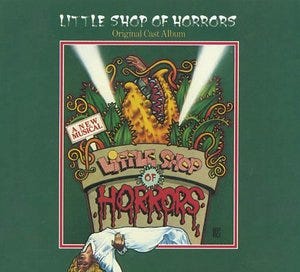There is a florist down the block and around the corner from me. Since moving so close by, I’ve browsed their storefront offerings semi-regularly and gone inside once looking for lavender. A guy and girl were working. Maybe they have other coworkers, maybe not. The place is small enough that I’m inclined to think not.
I wasn’t the only customer, but the girl came over immediately and offered her help. The guy, stationed behind the counter, wrapped my lavender plant with care after asking whether it was for me or someone else. I planned to clip part of it as a gift to someone else but didn’t need him to go to the trouble of wrapping the whole thing as such. He wished me a happy weekend and sent me on my way.
In my head I call the two of them Seymour and Audrey. Given where we are and the languages I know they speak, they couldn’t be less likely to have those names. But how else am I supposed to think of them?
This week I’ve been listening to the Broadway soundtrack of Little Shop of Horrors. It’s remarkable the influence the musical had despite not reaching the Great White Way until 2003, twenty-one years after its Off-Off-Broadway debut. Then again, it isn’t so remarkable, considering the roll composing pair Alan Menken and Howard Ashman were on—engineering the imminent Disney Renaissance, anyway. Menken in particular gained a reputation as the king of the ‘I want’ number, and, as a queer man, imbued countless young heroines’ searching songs with a powerful personal longing.
Eleven years ago, a very non-queer-presenting grown man told me he believed “Part of Your World” was the greatest song ever written. I wish that man a fantastic life to this day. But I didn’t want to harsh his vibe by telling him it wouldn’t exist without “Somewhere That’s Green.”
That song is an exemplar of its genre, as is the opener, and “Suddenly Seymour” as a love ballad. But Little Shop’s Audrey is no Disney princess, and, while Little Shop has the makings of a Disney story, its characters are denied the happy ending that their Disney successors enjoy. There’s hope for a while, hope that seems increasingly real, only for it to turn bad and then worse.
In keeping with the horror tradition, some characters receive karmic comeuppance: Orin Scrivello, D.D.S., for being an abusive partner (and, arguably, an abusive dentist); even Mr. Mushnik, down on his luck though he may be, for being a little too eager to capitalize on his hapless employee’s success with the strange plant. But the well-meaning characters are punished alike. I’ve loved the show since doing it my freshman year of high school, and not until this time round did the desperate sadness in the score really strike me. It’s as if these people are being mocked for daring to imagine a better life. Seymour is good-natured and sensitive but not stupid: he works out quite early on the dubious and/or outright evil methods it will take to nourish a plant of supernatural provenance. He neither craves nor acclimates to the attention and financial gain that accompany the plant’s growth. I doubt any guy who has ever played the role has asked about his motivations, because there’s only ever been one: to give Audrey the safe, loving environment she never had. The killing seems convenient enough, heroic even, when it’s a means of delivering her from danger and unhappiness—but, as with any slippery slope, it delivers her, and others, right back into it soon enough.
I noticed, too, the multiple opportunities that multiple characters have to end the cycle, to cut the plant off at the source and hit it where it hurts before it becomes too powerful. To say no. Out of ignorance or weakness, they buckle every time.
***
This ain’t your Sweeney Todd brand of killing plot. Too American. That is, a uniquely American story: not of personal vengeance but of thwarting your own better interests in pursuit of an illusory promise. And even being aware that you’re thwarting your own better interests but doing it anyway. We’re enacting that on a societal scale at unprecedented levels; we’re permitting it in our personal lives. Didn’t I just feed you? I ask, wringing my hands at the various institutions, the necessary evils.
Then there are the plants I open a vein for with no coercion. It’s dispiriting enough to watch my hard-earned money go hither and thither; it’s senseless to be crying in the club over a plant whose grip I could disentangle myself from if I marshalled the discipline. Perhaps there’s romance in self-sacrifice. Perhaps there’s a greener place on the other side. Hollywood tells us so.
Broadway knows better. Sooner or later the romance wears off, but the dependence doesn’t. It has to be shaken. The phrase What’s eating you? should probably reenter circulation, or we may never wake up to how comfortable we’ve become being consumed.
To get some perspective, and to remind myself to stop and smell the roses, I stroll by the florist and see what’s new. I admire the people inside. Not everyone is cut out to do florist’s work. You have to have a certain constitution to care for these silent creatures that determine the quality of the air you breathe, or whether you breathe at all. You have to be gentle and intuitive and unafraid. If only, the rest of us might say, a plant had a voice, and could tell us what it needed, and we could finally…But we ought to be glad they don’t. We know how that would end.
Side note: I wonder if Rick Moranis had more or less fun doing this movie than Streets of Fire. If you don’t know that one, I promise it’s one to see before you die.




